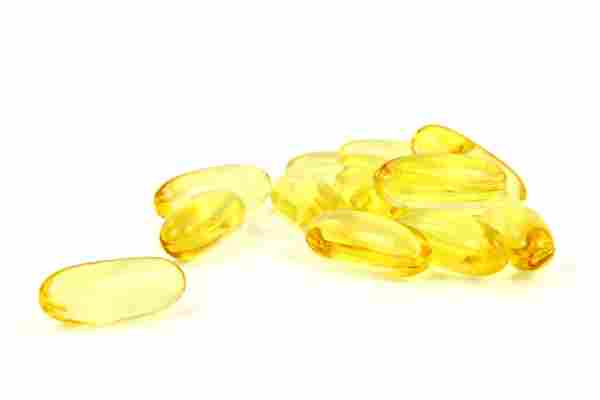Fish vs Fish Oil: The whole is greater than the sum of its parts
What is the Difference Between Fish Oil and Omega-3?
Content

There are many conversations going on about improving your diet and what kind of supplements are best for you. Omega-3, fish oil, essential fatty acids, docosahexaenoic acid and polyunsaturated fatty acids are just some of the terms that are being used when talking about those types of supplements and this can seem overwhelming and difficult to understand at first.
Additionally, different words are sometimes used to describe the same thing, which can be confusing to say the least! Here we will explain the difference between fish oil and Omega-3, to make sure that you can make an informed decision about what to include in your diet going forward.
Fish Oil and Omega-3, what is the difference?
Fish oil is an oil that is produced by the fish’s fat and tissues and contains Omega-3 fatty acids such as eicosapentaenoic acid (EPA) and docosahexaenoic acid (DHA). However, the fish does not produce those itself but acquires it through its diet by feeding on other fish and microalgae.
Introduction to omega-3 fatty acids
Omega-3s are a type of polyunsaturated fats and come in several forms, all of which are important for the human body and should be part of your diet. Some but not all of those forms of Omega-3 can be found in fish oil, and those words can therefore not be used interchangeably.
The biggest difference between fish oil and Omega-3 is that fish oil contains some types of Omega-3 fatty acids, which are a specific molecular configuration defined by its structure. Fish oil however, is more of an overall term for an oil that can be gained from a variety of fish and contains other elements besides Omega-3 fatty acids.
Now, to increase our intake of Omega-3 fatty acids, people often take supplements and call them “Omega-3 fish oil supplements” or just “fish oil”, which can lead to confusion about what the difference between the two is.
What are the different types of Omega-3s?
There are three types of Omega-3 fatty acids that are important for human physiology. They are polyunsaturated fatty acids, which means that their chemical structure has several double bonds, which makes them more stable, and they are widely distributed in nature and are found in both plants and animals.
The 3 main omega-3 fatty acids
EPA and DHA are commonly found in marine oils, with marine algae and phytoplankton as their primary source. However, they can also be found in meat, eggs and dairy from grass-fed animals.
The third type, alpha-linolenic acid (ALA), is found in plant oils such as flaxseed oil, and can also be found in other plant based foods such as soybean products or walnuts. Therefore, not all Omega-3s are found in fish oil, but out of the three that are relevant to us, only EPA and DHA can be gained from marine based oils such as fish oil.
essential fats
Humans are not able to produce these essential fatty acids themselves, so it is crucial to include them in your diet by eating oily fish or making sure we top up our Omega-3 intake with a food supplement. Learn more about which products provide abundant amounts of Omega-3 fatty acids. However, if you are not sure if you can cover the recommended amount of Omega-3 through your diet alone, it might be worth looking into a high quality Omega-3 food supplement such as Omega 3 of Norway.
Why is Omega-3 important for us?
ALA is the most common of these Omega-3 fatty acids and in our bodies it is mostly used for energy. It is possible for mammals to form the long-chain forms (EPA and DHA) out of the short-chain Omega-3 ALA by creating additional double bonds along its carbon chain and extending it. This process is called desaturation and elongation. However, with an efficiency of below 5% only small amounts of EPA and then DHA can be produced this way, and our ability to do so also decreased while we get older.
Health benefits of omega-3
DHA is the most important Omega-3 fatty acid in your body and also the longest chain of the three we mentioned above. It is a key structural component of your brain, the retina and many other body parts. Other health benefits of Omega-3 fatty acids are their anti-inflammatory effect and positive impact on the cardiovascular system and even on your skin!
What is fish oil?
Fish oil is a much broader term and describes oil that is produced by the fish’s fat and tissues. To be ready for human consumption, it is extracted from the flesh of fatty fish such as herring, tuna, anchovies, mackerel and salmon.
Omega-3 from marine sources
Like we mentioned above, fish oil only contains two out of the three Omega-3 fatty acids that we need, namely EPA and DHA. However, just like humans, fish cannot produce those themselves but acquire them by feeding on phytoplankton, which absorb microalgae which is the original source of the Omega-3.
Fish oil contains about 30% of pure Omega-3 fatty acids, however when it comes to fish oils that are used as food supplements, the concentration of EPA and DHA can vary from 8% to 80%.
Make sure you choose quality
So, when picking out a food supplement it is important to look at the concentration of those Omega-3 fatty acids in each product and to make an informed decision about which brand to go for.
Omega 3 of Norway for example not only offers a high quality fish oil food supplement gained from wild water fish, but also has a range of red krill oil products which also contain high levels of Omega-3.
How to choose the best Omega-3 fish oil supplement for you
Another important thing to consider when choosing your Omega-3 fatty acid supplement is the form of those fatty acids. Naturally, Omega-3 fatty acids occur as triglycerides, which is the molecular structure that fats and oils assume in plants and animals. In this form, they are long-chain polyunsaturated fatty acids and can be more easily absorbed by our body. Additionally, this form is more stable and therefore provides a higher degree of protection against oxidization (to react with oxygen).
Triglycerides vs ethyl esters
A lot of products on the market however, are fish oil concentrates, where the Omega-3 fatty acids are combined with ethanol to form so-called ethyl esters. Those can then reach a higher concentration of Omega-3 fatty acids, however they are more difficult to digest and to absorb in our body. And while both contain Omega-3 fatty acids, a comparison can be drawn between fresh orange juice and juice from concentrate, which are kind of the same, but also not.
So when making your choice consider the following elements: how high is the concentration of ALA, EPA and DHA in the Omega-3 food supplement of your choice? And do those Omega-3 fatty acids exist in their natural form as triglycerides, meaning that they are bonded to a glycerol backbone, or have they been combined with ethanol to form a so-called Omega-3 fish oil concentrate?
Conclusion
While fish oil is a general term for oils made from the tissue of fish, omega-3 describes a specific form of fatty acids, that are essential for our health and well-being but that our body cannot produce itself. This means, we need to ingest them through food or via a supplement, like fish oil!
Here are the main differences between fish oil and omega-3:
fish oil is made from fish, omega-3 are a type of fat
all fish oils contain omega-3 but not all forms of omega-3 come from fish
omega-3 have many health benefits
fish oil contains omega-3, but its health benefits depends on the quality of the oil, the concentration of EPA and DHA and other factors
Here at Omega 3 of Norway, we prioritise natural products and our fish oil contains 90% triglycerides, which makes them easy to absorb into your body and thanks to an odour neutral capsule made of high quality gelatine, there is little to no taste or smell of fish! So if you are looking for a wide range of high quality Omega-3 fatty acids supplement, head over to our shop and have a look!
Visit our online shop to find out more about our products and get inspired to get healthy today!
Fish Oil vs. Omega-3: What's The Best Supplement?
Fish oil is the concentrated and purified oil from—you guessed it—the tissue of oily fish. There are a variety of forms this fat can be delivered in based on how the fish oil is processed. (By "form," we mean the type or chemical structure of the omega-3 fats.)

The main forms are triglyceride, ethyl ester, and phospholipid. The native form of fat is triglyceride for fish and humans. It's also the most bioavailable form3 more easily absorbed and accessible to your cells).*
"For fish oil, the triglyceride form is where it's at," Ferira shares. "The triglyceride form is how marine omega-3 fatty acids EPA and DHA are found in the fat of the fish—and how we consume and absorb fat in our diet. In other words, it's the form found in nature and native to the fish."
Fish oil comes from many types of fish—including salmon, anchovies, tuna, sardines, herring, and mackerel. We recommend choosing fish oil derived from a thin fish (such as anchovies or sardines), as those are less likely to have high levels of mercury and other metals than bigger fish. Ferira explains that, of course, this is not a concern when taking top-notch fish oil, as "high-quality fish oil products are highly purified to achieve negligible trace levels of contaminants like heavy metals."
Fish vs Fish Oil: The whole is greater than the sum of its parts
Registered Holistic Nutritionist, and Skipper Otto’s member, Melissa Evanson continues her series of nutrition-focused blog posts tackling the issue of the nutritional value of fish vs fish oil.

Like many trends in nutrition, fish oil is still enjoying its time in the limelight. This is because the omega-3 fatty acids in fish oil have been linked to prevention of heart disease and dementia, to name a few. So for those who may not have access to, or enjoy, wild fish and seafood, popping a pill every morning can seem like a viable option to help ward off disease.
But while early research on fish oil was promising, many studies are now showing mixed outcomes, with many not showing any significant impact on health at all. So why is the data so confounding? And why might eating whole fish on a regular basis be the best way to address health and disease prevention?
FRESHNESS MATTERS
So you want to make a fish oil supplement. First you’ve got to catch the fish. Then you need to transport it to a processing plant and turn it into fish meal. Next you have to refine, purify and clean the oil. Finally you have you package it and distribute it to the store where it will remain until purchased. Each one of these stages can compromise product quality. And quality control is especially important for fish oil because it is chemically unstable and highly prone to oxidation. Studies have shown 50-83% of the fish oils tested exceeded at least one of the measures of acceptable oxidation. Once oxidized, fish oil can have a “fishy” flavour and odour, reduced shelf life, and lower levels of omega-3s than the labels claim. There is also some evidence that oxidized fish oil may increase risk factors of disease like inflammation. Even so, the effect of oxidized fish oil on human health hasn’t been well studied.
This difference in fish oil quality, and the fact that most clinical trials don’t test the oxidative state of the fish oils, may explain inconsistencies in study results. A study published in 2013 showed that fish oil quality (oxidative state) had significant impacts on heart disease markers (triglyceride and cholesterol levels). In that study, fish oil capsules with lower levels of oxidation showed improved heart disease markers compared to highly oxidized omega-3 capsules, which had a negative effect on cholesterol levels. All this to say, unless you are purchasing omega-3 supplements from a reputable manufacturer that tests for oxidative stability, the benefits of taking omega-3 supplements may be questionable.
NATURE’S MULTIVITAMIN
Omega-3 fish oil supplements contain EPA and DHA, the primary anti-inflammatory fats. But, unlike whole fish and seafood, omega-3 supplements typically don’t contain other micronutrients like vitamin D, selenium, iodine and B vitamins. B vitamins, are especially important because they work with omega-3s to support brain function reducing the likelihood of dementia. The greatest benefit of eating whole fish then, is because it offers a whole range of micronutrients that not only support a broad range of our nutritional needs but also are designed to work together to optimize their use in the body.
MAXIMIZE ABSORPTION
Our bodies are designed in a way that efficiently takes and uses nutrients from whole foods. Studies comparing fish to fish oil have shown that omega-3 supplements aren’t used as well by our bodies as those in food form. This may be because of the larger amount of overall fat in whole fish, which can better activate fat absorption in the body. This difference in absorption might explain why eating even low or moderate amounts of fish (1-4 servings/week), can be protective against cardiovascular disease.
BOTTOM LINE: For most of us, eating whole fish, like wild BC salmon and salmon roe (my favourite!), several times a week will provide us with all the protective omega-3 fatty acids our body needs with no ‘fishy’ burps!
Have questions about seafood and nutrition? Email us at [email protected] with your questions and Melissa will be happy to answer them!

